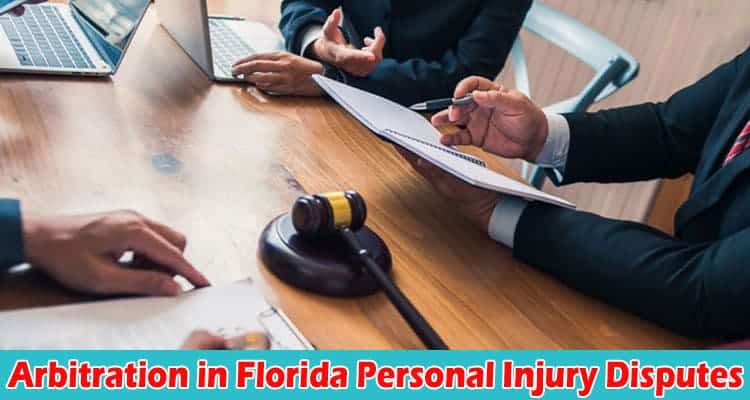In personal injury disputes, the paths to resolution extend beyond the courtroom. Mediation and arbitration have emerged as alternative dispute methods for settling such cases in Florida, offering distinct advantages and a different approach to traditional litigation. Inquiring about the intricacies of mediation and arbitration reveals how these processes work, their benefits, and how they differ from the conventional route of a courtroom trial.
A Collaborative Approach to Resolution
Mediation is a voluntary and non-adversarial process aimed at resolving disputes with the assistance of a neutral third party, known as a mediator. Unlike judges or juries, the mediator doesn’t make a binding decision but facilitates productive communication between the parties involved.
This collaborative approach focuses on finding common ground and crafting mutually agreeable solutions, emphasizing compromise and cooperation rather than contention.
The Mediation Process
Mediation proceedings typically begin with two parties and their respective legal representatives convening in a neutral setting. The mediator acts as a mediator-facilitator, guiding the discussions and helping each side present their case. The mediator’s role is to encourage open dialogue, identify underlying interests, and generate potential resolutions.
Through private meetings with each party and joint sessions, the mediator works towards finding commonalities and fostering an environment conducive to settling the dispute. When the parties may find it challenging to communicate directly, the mediator becomes a conduit for effective interaction.
This process empowers both sides to reach a resolution that aligns with their interests without needing a protracted courtroom battle. Many law firms recognize the significance of mediation in pursuing the best outcome for personal injury victims. The Meldon Law firm fights for victims and works hard in mediation to effectively reach an outcome for your claim.
Advantages of Mediation
When it comes to resolving legal disputes, mediation stands as a beacon of alternative resolution. This method offers a range of benefits, making it an attractive choice for parties seeking to find common ground and reach a mutually agreeable solution.
Here are some of the advantages that mediation brings to the table and how they can positively impact the process of resolving legal conflicts:
- Control over the outcome: Unlike traditional litigation, where a judge or jury determines the outcome, mediation grants the parties the power to shape their resolution. This control can lead to more tailored and creative solutions that address the case’s unique circumstances.
- Confidentiality: Mediation is confidential, meaning that discussions and information shared during the process remain private. This can encourage open and honest communication without the fear of statements being used against either party in a later trial.
- Cost-effectiveness: Mediation often proves to be more cost-effective than a court trial. The streamlined process reduces legal fees and other expenses associated with formal litigation.
- Preservation of relationships: Personal injury disputes sometimes involve parties who have ongoing relationships, such as family members or business associates. Mediation helps preserve these relationships by promoting a less adversarial atmosphere and encouraging cooperation.
A More Formal Alternative
Arbitration is another alternative dispute resolution mechanism where a neutral third party, called an arbitrator, reviews the evidence and renders a binding decision. While it is a more formal process than mediation, it still offers a streamlined approach compared to traditional litigation.
The Arbitration Process
In arbitration, the disputing parties present their cases to the arbitrator, a decision-maker. The process is similar to a trial, with both sides providing evidence, witnesses, and arguments to support their claims. However, the arbitration process tends to be less formal and more flexible than courtroom proceedings.
Once both parties have presented their cases, the arbitrator issues a binding decision, which is enforceable by law.
Advantages of Arbitration
In the legal world, arbitration emerges as a distinct approach that offers unique advantages. Below are the benefits of arbitration and how it makes an efficient method of resolving legal conflicts.
- Efficiency: Arbitration generally moves faster than a traditional court trial, as it avoids the backlog of cases often found in the judicial system.
- Expertise: Parties can select arbitrators with expertise in the relevant field, ensuring that the individual making the decision is knowledgeable about the subject matter.
- Cost-savings: Arbitration involves some costs, but it can still be more economical than a full-blown court trial due to its quicker timeline and more focused procedures.
- Privacy: Like mediation, arbitration proceedings are private and confidential, preserving sensitive information from becoming public records.
Key Differences Between Mediation and Arbitration
While both mediation and arbitration offer alternatives to courtroom litigation, they differ in their approaches and outcomes. Mediation prioritizes compromise and collaboration, with the mediator facilitating discussions but not rendering a binding decision.
In contrast, arbitration provides a more formal process where an arbitrator evaluates evidence and issues a binding decision for all parties. Choosing between mediation and arbitration often depends on the nature of the claim, the desired outcome, and the parties’ preferences.
Move Forward In Your Personal Injury Claim With Direction
Mediation and arbitration present valuable alternatives to the traditional courtroom trial in personal injury disputes. Understanding the mechanics and benefits of mediation and arbitration empowers parties to make informed decisions about pursuing a resolution. Whether through the collaborative environment of mediation or the more structured arbitration process, these alternative dispute resolution mechanisms provide avenues for achieving just and satisfactory resolutions outside the courtroom.







